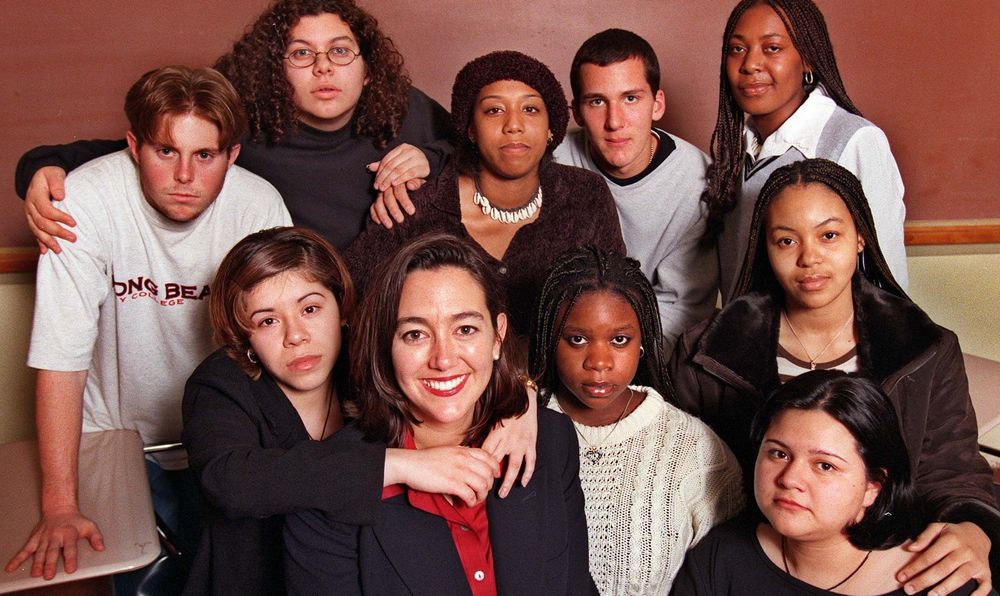Freedom Writers is a film about modern-day Freedom Riders. The Freedom Riders were civil rights activists who rode interstate buses in the early 60s to test the US Supreme Court’s decision to desegregate buses. The Freedom Writers were students inspired by their pioneering teacher to embrace racial integration.
Hilary Swank stars as Erin Gruwell – a young teacher who challenged her students to ditch racial stereotypes and embrace each other regardless of race. She used a modified syllabus to teach the kids essential pieces of racial history and encouraged them to journal their experiences. Excerpts from the students’ journals created the New York Times’ bestseller titled The Freedom Writers Diary.
Let’s look at the true story that inspired Freedom Writers.
Erin Gruwell and her students at Woodrow Wilson High School inspired Freedom Writers

Erin Gruwell arrived at Woodrow Wilson High School in 1994 as a student-teacher. She taught a diverse group of students, many of whom came from supportive families and a few who’d endured sexual abuse, domestic violence, and homelessness. Erin talked to PBS SoCal about her group of students:
“What I found, because I was brand new and I didn’t live in the city, was that there was a lot of intrinsic separation and masked racism. It happened to the kids I ended up teaching because I had all the kids who were busted, kids who had learning disabilities and kids had trouble with the law. I was basically this new teacher given the students that nobody else wanted.”
Gruwell’s desire to effect change sparked after she found several students ridiculing their classmate’s race. She compared the racist remark to Nazi propaganda and was surprised to learn that only one of her students knew of the Holocaust.
So, Gruwell modified her syllabus to educate her students on the history of racial feuds in the world. Gruwell’s pupils read The Diary of Anne Frank and Zlata’s Diary instead of Shakespeare and the classics. They listened to Miep Gies, the woman who hid Anne Frank from the Nazis.
Gruwell’s approach worked as the students learned of the power of personal storytelling. They also learned of the destructive potential of racial stereotypes and the ruin racial wars had brought upon the world.
Erin encouraged her students to journal their experiences, bringing them closer together. Excerpts from the journals feature in The Freedom Writers Diary. Erin talked to PBS SoCal about how she got her students to share their journal entries:
“So my pitch to my students was, ‘Could you imagine someday that there’s going to be a kid who was homeless just lke you? There’s going to be a kid who lost her dad just like you. And you will become the authority of your authentic story.’ We were going to go to DC as the original Freedom Riders did in the ‘60s to change segregation.”
It took writer and director Richard LaGravenese six years to craft a narrative from The Freedom Writers Diary’s entries. From that story, he created the inspiring film Freedom Writers.
The movie faced criticism for its depiction of the school and other teachers
Few contested that Freedom Writers was an inspiring film. However, a significant group protested the film’s depiction of Woodrow Wilson High School and some of its teaching staff. People associated with Woodrow High lamented that the film portrayed the school as dangerous.
Erin argued that from 1993 to 1998, Woodrow High wasn’t the exemplary school that it was when the film debuted. She told The Los Angeles Times:
“People who are making comments don’t know the true story. When you take a subject matter of intolerance, we had to look at every single angle of a story to bring it to life. When it comes to complexities of race, people need to talk about the fact that this is an enormous city that has been compartmentalized.”
People also found fault with Gruwell’s teaching methods, claiming that she spent too much time teaching life skills and ignoring the basics. Barbara Walters on The View offered a castigating assessment of Erin’s approach, stating her methods fell short of academic standards.
Fran Sawdei, one of the parents whose child learned under Erin, disagrees sharply with Barbara Walters’ opinion. “She gave those kids manners, she gave them etiquette, she gave them connections,” Fran told The Los Angeles Times. “She really taught them skills for life.”
Critics also slated the film for its sordid depiction of other teachers at the school. Erin did a fantastic job, but she didn’t do it alone: she relied on other teachers, a fact that the film fails to address. The effect is that the other teachers at Woodrow High came out as lazy and worse, as opponents of Erin’s work.
Glenn Whipp of Long Beach Press-Telegram wrote: “Judging from the film, you’d think that no teacher had ever tried this. Worse, you’d guess that apart from the noble Gruwell, no other teacher cares… Gruwell’s work is noteworthy, but its by no means unusual, despite the film’s cartoon-like portrayals of her bitter, envious and, in one case, racist colleagues.”
Also Read: Freedom Writers now: They form part of the Freedom Writers Foundation